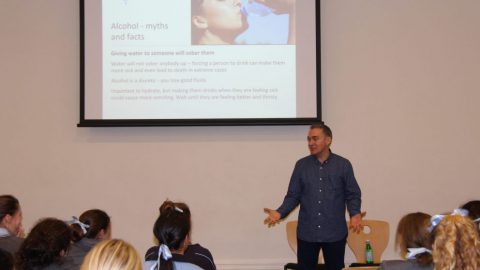From the Director of Student Wellbeing

St Catherine’s Years 10, 11 and 12 students attended Paul Dillon’s Drug and Alcohol Education presentations last week. Paul has been working in the area of drug education for the past 25 years. Through his own business, Drug and Alcohol Research and Training Australia (DARTA), he has key knowledge on current trends and best practice drug education. His book ‘Teenagers, Alcohol and Drugs’ remains a useful guide to parents.
Parents are encouraged to visit Paul’s blog for parenting advice and tips. Click here for his recent posts, including ‘the importance of having the alcohol and other drug talk’ to ‘build an ongoing dialogue’ with your teenager about alcohol and drug use. He also recommends Robert MacKenzie’s book, Setting Limits with Your Strong-Willed Teen, saying ‘I thoroughly recommend it to any parent struggling with an adolescent who is ‘pushing all their buttons’!’
Despite the fact that alcohol continues to be the most popular and problematic drug used by teenagers, Paul emphasises that growing numbers of school-based young people are reporting choosing not to drink alcohol, and the proportion who classify themselves as ‘non-drinkers’ continues to increase. Using the 2014 Australian Secondary Students Alcohol and Drug (ASSAD) survey results, Paul strives to promote positive attitudes and values amongst students, as well as to help support young people to make healthy and safe choices.
I have included a summary of his Years 10, 11 and 12 presentations below:
Year 10
Young people, alcohol and risk taking: Looking after your mates
The Year 10 presentation focuses primarily on alcohol and attempts to debunk some of the myths in this area. In an effort to ensure that young people are able to make healthier choices, Paul provides accurate, up-to-date and credible information, including the latest prevalence rates of alcohol and other drug use by secondary school students, the risks associated with drinking spirits, as well as the dangers associated with the disinhibiting effect of alcohol. Paul discusses basic life skills around alcohol-related emergencies, particularly in regards to looking after themselves and their friends.
Year 11
Alcohol and cannabis: What if something goes wrong?
Building on the information delivered in the Year 10 session, the Year 11 session focuses on the risks around alcohol use for young people, as well as introducing information on cannabis. Practical strategies around ‘looking after your friends’ will be reviewed and additional information provided. Potential harms associated with cannabis use are discussed, with a particular emphasis on its impact on mental health. The presentation also examines the impact of alcohol on the adolescent brain.
Year 12
Last year at school: What do I need to know about alcohol and other drugs?
This presentation provides information on a range of issues that students in this age-group are likely to face currently or in the years ahead. Many of these students will now be driving or about get their licence so drink driving and the process of random breath testing (RBT), as well as roadside (RDT) or mobile drug testing (MDT) are covered. Paul discusses the physical risks associated with illicit drugs such as ecstasy and the impact that being caught with an illicit substance can have on a young person’s life.


